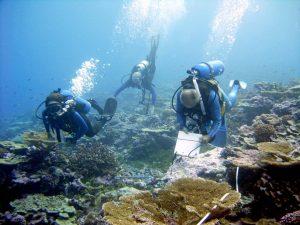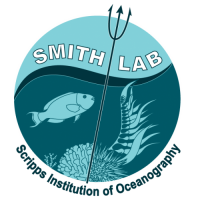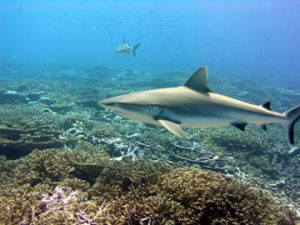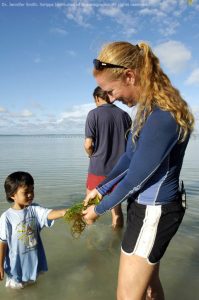The Smith Lab is focused on understanding how humans impact marine ecosystems, in both tropical and local environments, and developing strategies for restoring or preserving these environments for future generations. Members of the Smith Lab are performing experiments to identify ways to restore degraded environments and are participating in expeditions to remote parts of the world to document pristine, relatively non-impacted coral reefs to set baselines and targets for conservation.
Study Sites
The Smith Lab is working both locally in California and on coral reefs in the Central Pacific as well as the Caribbean to document how ocean acidification has been and will be affecting the calcification and growth of marine plants, corals, and other invertebrate species. Jen’s lab group includes postdoctoral researchers, PhD students, Master’s students from SIO and UCSD, and several undergraduate interns and volunteers who are all interested in conducting research that is relevant to solving human-induced problems in the ocean. Jen and her students are collectively working to identify how local impacts (overfishing, different types of pollution, and the introduction of invasive species) as well as global impacts (climate change and ocean acidification) affect marine biodiversity and community structure.
Solution-Based Approaches

Results from research done by the Smith Lab are providing an opportunity to examine possible solutions to some of the most serious problems facing tropical coral reefs. By focusing beyond the immediate results of their studies, Jennifer and her students are able to place their findings within a larger context of marine ecosystem restoration and protection. This perspective has allowed the Smith Lab to offer unique insights and important data that have been used by state agencies to develop, monitor, and evaluate the effectiveness of various management strategies on these threatened ecosystems.
Conservation Science
Much of the research that takes place in the Smith Lab has direct ecological conservation relevance. Jennifer and her students strongly believe that in this day and age, it is their responsibility as scientists to not just document the current status of marine ecosystems and the impacts that humans have had on them but to identify ways in which we, as humans, may live more sustainably with these systems.
Community Outreach
Members of the Smith Lab are committed to ensuring that their scientific results are communicated to an audience beyond just scientists. They believe that the results of their studies are only important if they can be translated to stakeholders such as the general public, policy makers, and natural resource management agencies, in an effective way. Results are disseminated through websites, blogs, popular articles and local media outlets, and by leading workshops and training volunteers around the world.
Core Values
“If enough species are extinguished, will the ecosystems collapse, and will the extinction of most other species follow soon afterward? The only answer anyone can give is: possibly. By the time we find out, however, it might be too late. One planet, one experiment.” – E.O. Wilson
Meet the Scientist

Scripps Institution of Oceanography researcher Jennifer Smith with dive gear
Dr. Jennifer Smith is a Professor in Marine Ecology and Conservation at the Scripps Institution of Oceanography, UCSD. She and other members of her lab are focused on understanding how humans can impact marine ecosystems in both tropical (coral reefs) and temperate (kelp forests and intertidal) environments, in order to better protect them from local and global stressors and thus help to ensure their survival into the future.
To find out more about the Smith Lab, check out their Facebook page or the Coral Reef Systems website.



